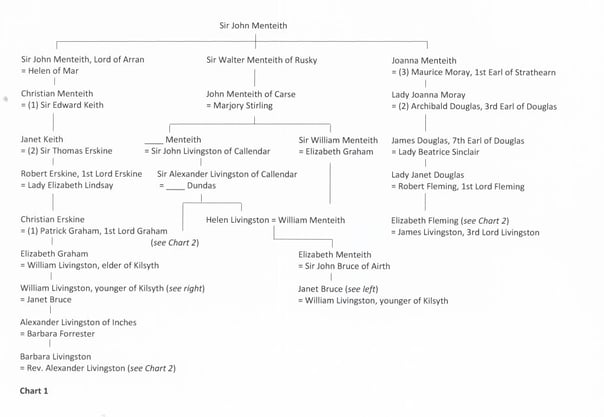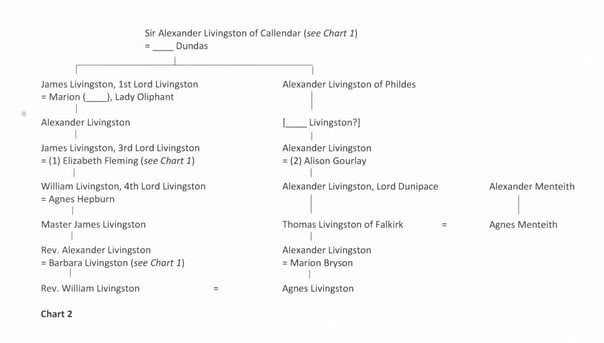[Author's note: This blog post originally appeared in Vita Brevis on 20 November 2019.]
As I work at reconstructing the environment in which the Livingstons of the sixteenth and seventeenth centuries lived, I have been struck by the frequency with which I have encountered members of the Menteith family. (It is fair to say that there are a number of such families in this project, interrelated in various ways, but the Menteiths keep turning up!) To arrive at the early modern Livingston family, I have gone back on various lines (including the ancestry of Livingston spouses), so the resulting family trees cover individuals who were not named Livingston – or aware of these particular connections.
The earldom of Menteith was evidently the earliest documented instance of a Mormaer, a regional governor responsible to the Scottish king; he appears in the records in 1164, during the reign of King Malcolm IV. This first earl, Gille Crist [Gilchrist], was succeeded by his son Murdoch, whose sons – both named Maurice – succeeded to the title. The second Maurice had two daughters; like their father and his brother, they held the title successively.
The Menteith estates were attractive enough to tempt Walter Bailloch [“the freckled”], a younger son of the (3rd) High Steward of Scotland, who married Mary, Countess of Menteith in her own right, and held the peerage even after his wife’s death.[1] A younger son of this marriage, Sir John Menteith, bears an unsavory reputation for capturing William Wallace and handing him over to the English for execution.[2]
A younger son of this marriage, Sir John Menteith, bears an unsavory reputation for capturing William Wallace and handing him over to the English for execution.
It is from Sir John that (almost) all the family members now named descend. The elder son of Sir John Menteith, also Sir John, became Lord of Arran and Knapdale. Through his marriage to Helen of Mar, a daughter (or sister) of the Earl of Mar, this branch of the Menteith family became heirs to the Mar earldom,[3] and during the sixteenth century successfully secured the title. The line to the Livingstons passes through the Keith, Erskine, and Graham families until, in 1480, Elizabeth Graham married William Livingston, elder of Kilsyth.[4]
Sir John Menteith’s daughter, Joanna, was married four times: first to Malise (IV), Earl of Strathearn; second to John Campbell, 1st Earl of Atholl; third to Malise’s grandson Maurice Moray, 1st Earl of Strathearn; and fourth to William Sutherland, 5th Earl of Sutherland.[5] These marriages produced just one child, Lady Joanna Moray (by Maurice), who married, first, Sir Thomas Moray of Bothwell, and, second, Archibald Douglas, 3rd Earl of Douglas.[6] If it is true that the 3rd Lord Livingston married Elizabeth Fleming as his first wife, here is a second Menteith line.[7]
The younger son of Sir John Menteith was Sir Walter Menteith of Rusky. His son was John Menteith of Carse, the Sheriff of Clackmannan in 1352, who married Marjory Stirling of Carse as her second husband. An unnamed daughter of this last marriage is identified as the first wife of Sir John Livingston of Callendar.[8]
John and Marjory’s son and heir was Sir William Menteith of Carse, who married Elizabeth Graham, the “daughter of Graham.” Their son married his first cousin once removed, Helen Livingston, daughter of Sir Alexander Livingston of Callendar.[9] One of the children of this Menteith–Livingston marriage was Elizabeth Menteith, who married Sir John Bruce of Airth. It is sad to relate that, in keeping with the bloody history of Scotland during the fifteenth century, Elizabeth’s brothers murdered their brother-in-law, Sir John, for which they later made public amends[10] – not a particularly effective deterrent, perhaps!
...Elizabeth’s brothers murdered their brother-in-law, Sir John, for which they later made public amends – not a particularly effective deterrent, perhaps!
There is some dispute about whether Sir John or his son Sir Robert was the father of Janet Bruce, who married William Livingston, younger of Kilsyth – the chronology, as so often in medieval genealogical research, is tight where it is not lacking altogether, so I have gone with Sir John Bruce and Elizabeth Menteith as Janet’s parents.[11]
And, last but not least, a mysterious Menteith family not covered in The Red Book of Menteith: Alexander Menteith, whose daughter Agnes married Thomas Livingston, the natural son of Alexander Livingston, later Lord Dunipace.[12] How do they fit in?!
Notes
[1] It should be noted that another collateral connection exists, since Margaret Graham, Countess of Menteith in her own right and a descendant of Sir John Menteith’s older brother, married (as her fourth husband) Robert Stewart, Duke of Albany (son of King Robert II). After Margaret’s death, her widower married Muriel Keith, from which marriage the Flemings of Biggar and Cumbernauld were descended. William Fraser, The Red Book of Menteith, 2 vols. (Edinburgh, 1880), 2: 457.
[2] Ibid., 458, 459.
[3] Ibid., 460.
[4] Sir James Balfour Paul, ed., The Scots Peerage, 9 vols. (Edinburgh, 1904–11), 5: 579–81, 596, 598–600, 601, 604–5, 185–86.
[5] Fraser, The Red Book of Menteith, 2: 460.
[6] Paul, The Scots Peerage, 1: 434–35 (Atholl), 8: 251–52, 255–58 (Strathearn and Sutherland), 3: 157, 161–63, 172–74, 175 (Douglas); Edwin Brockholst Livingston, The Livingstons of Callendar and Their Principal Cadets: The History of an Old Stirlingshire Family (Edinburgh, 1920), 62–63.
[7] Paul, The Scots Peerage, 9: 129.
[8] Fraser, The Red Book of Menteith, 2: 461.
[9] Ibid. Paul, The Scots Peerage, 5: 426, 429, does not list Helen Livingston among the children of Sir Alexander Livingston and ____ Dundas; Janet Livingston, elsewhere married to Sir James Hamilton of Cadzow, is here the wife of Sir Robert Bruce of Airth. The Scots Peerage corrigenda volume (9: 129) gives the Livingston–Hamilton marriage, but is silent on the Livingston–Menteith alliance.
[10] “In 1488 and 1490, [William Menteith of Kerse and Alva], William his son, Archibald and Alexander his brothers, and others, gave security and asked pardon for the slaughter of Sir John Bruce of Stanehouse, their brother-in-law.” Fraser, The Red Book of Menteith, 2: 461.
[11] Sir John Bruce is the choice of Fraser, The Red Book of Menteith, 2: 461, married in 1471 and assassinated in 1483 (see M. E. Cumming Bruce, Family Records of the Bruces and the Cumyns… [London, 1870], 320, for another account); Paul, The Scots Peerage, 5: 187–88, gives his son and heir Sir Robert, who would be young to have a married daughter in 1504.
[12] Livingston, The Livingstons of Callendar, 342–46.
Share this:
About Scott C. Steward
Scott C. Steward has been NEHGS’ Editor-in-Chief since 2013. He is the author, co-author, or editor of genealogies of the Ayer, Le Roy, Lowell, Saltonstall, Thorndike, and Winthrop families. His articles have appeared in The New England Historical and Genealogical Register, NEXUS, New England Ancestors, American Ancestors, and The Pennsylvania Genealogical Magazine, and he has written book reviews for the Register, The New York Genealogical and Biographical Record, and the National Genealogical Society Quarterly.View all posts by Scott C. Steward →

